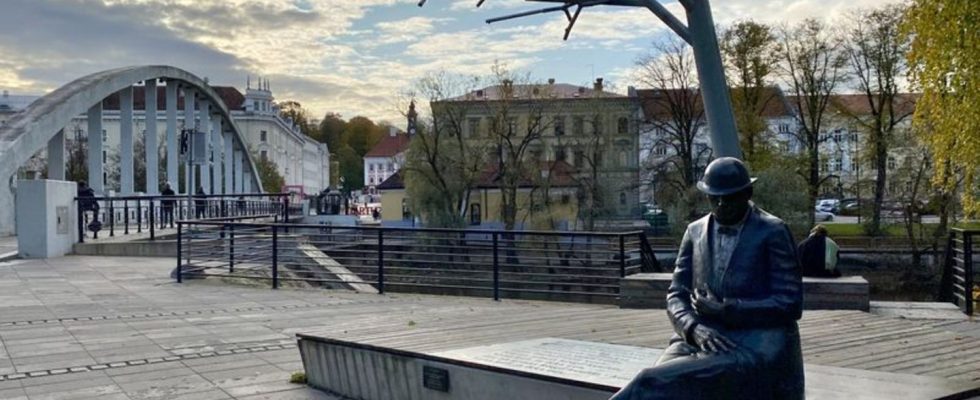outlook
Capitals of Culture 2024: Bodø, Tartu and Bad Ischl
View of the monument to the Estonian journalist and poet Johann Voldemar Jannsen in Tartu. photo
© Alexander Welscher/dpa
Bodø, Tartu and Bad Ischl will be hosting hundreds of events next year. From mass kisses to a concert with Conchita Wurst, everything is there. But the organizers are not just interested in partying and having fun.
Whether it’s a Midsummer festival above the Arctic Circle, a sauna debate festival in the Baltics or exhibitions about the dark sides of the Alps: Bodø in Norway, As European Capitals of Culture for 2024, Tartu in Estonia and Bad Ischl in Austria invite you to explore two lesser-known regions and a popular tourist destination.
Alps beyond the Lederhosen idyll
Bad Ischl is best known as a romantic health resort where Emperor Franz Joseph and Empress Sisi spent their summers. In the surrounding region, blue lakes and towering mountains attract hundreds of thousands of guests from all over the world every year. Next year, Bad Ischl and 22 other municipalities in the so-called Salzkammergut want to show in over 300 projects what lies behind the Alpine landscape near the border with Bavaria – from over-tourism to the consequences of climate change to the historically burdened past. The goal is to “illuminate the positive and negative sides of this entire region and not to turn it into a fireworks display or a festival,” says program curator Elisabeth Schweeger.
At the beginning of the Capital of Culture year on January 20th, Bad Ischl is still treating itself to a show: Tom Neuwirth, who comes from the Salzkammergut, better known as ESC winner Conchita Wurst, will take part in the opening concert together with rappers and a thousand-voice yodeling choir.
Salt has been mined in the Salzkammergut for 7,000 years. The Chinese artist Ai Weiwei deals with this tradition in a show. Other exhibitions are dedicated to cultural assets looted under the Nazi regime and hidden in a salt mine during World War II. Concerts with music by Arnold Schönberg and an operetta by Oscar Straus highlight the many Jewish artists and art lovers who were closely connected to the Salzkammergut.
“Young Blood City” with a long history
Tartu may only be the second largest city in Estonia and is economically well overshadowed by the capital Tallinn. But when it comes to culture, the old university and Hanseatic city is at least on the same level – it has always been considered the heart and soul of the small Baltic state in northeastern Europe with only 1.2 million inhabitants. “Tartu has always been a center for science, education and culture in Estonia,” says Mayor Urmas Klaas about the oldest city in the Baltics.
The city of almost 100,000 residents was once the cradle of Estonian national awakening and the birthplace of the Estonian song festival, Estonian theater and, essentially, the Estonian state. On February 2, 1920, the Peace Treaty of Dorpat – the old German name for Tartu – was signed there, in which Soviet Russia recognized the sovereignty of Estonia, which declared itself independent in 1918.
As a cultural capital, Tartu and the surrounding region now want to become more visible outside of Estonia. For this purpose, over 1000 events are organized under the motto “Arts of survival”. The program is scheduled to open in the student-dominated city, which is sung as “Young Blood City” in a specially composed Tartu 2024 anthem, on January 26th. Highlights, especially in summer, include the mass kissing event “Kissing Tartu”, the sauna debate festival “Naked Truth” or the play “Business as Usual” about the money laundering scandal involving Danske Bank in Estonia.
First cultural capital north of the Arctic Circle
Bodø in Norway is the first European Cultural Capital north of the Arctic Circle. With more than 1,000 events, the city and the surrounding Nordland region want to show Europe that they not only have breathtaking Arctic nature, but also an appealing culture. The organizers hope for more than 500,000 visitors over the course of the year – and for the “longest party in the world,” as Bodø previously said. The region is huge: If you drive through Nordland from north to south, you will cover a good 800 kilometers – that is roughly the distance from Hamburg to Munich.
“Bodø2024” is the largest cultural project that has taken place in Northern Norway to date. Bodø aims to be the most sustainable European Capital of Culture ever and to host the world’s most sustainable Pure Music concert in the spring. The culture of the Sami, the indigenous people in the region, will also receive a special focus with, among other things, a multi-part musical theater piece.
Several events have connections to Germany, including the opening ceremony on February 3rd: There will be a spectacular harbor event with the Berlin artist collective Phase7 and a specially built floating stage – the organizers are expecting up to 20,000 visitors in the city with around 50,000 inhabitants. A major outdoor event is planned for Midsummer on June 22nd – the time when you can admire the midnight sun. And when the days get darker again, there will be Nordland’s first light festival in November and December.

